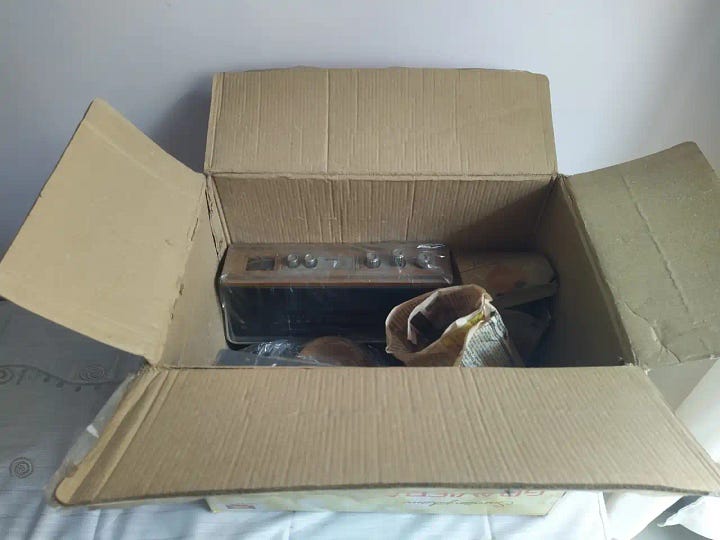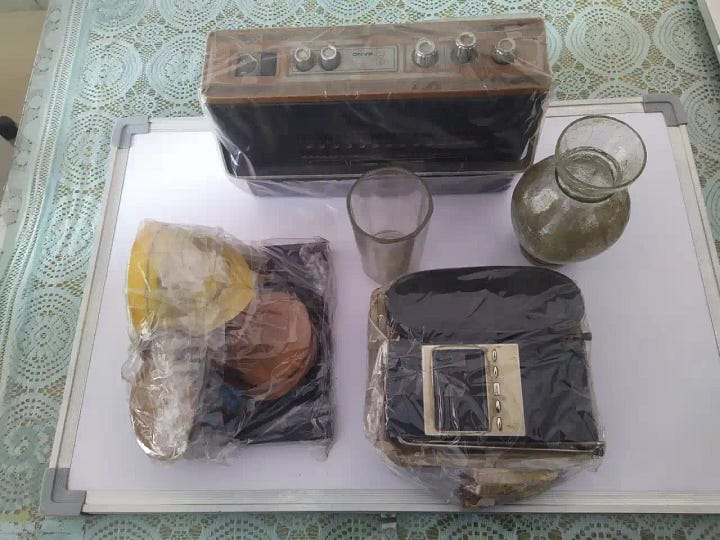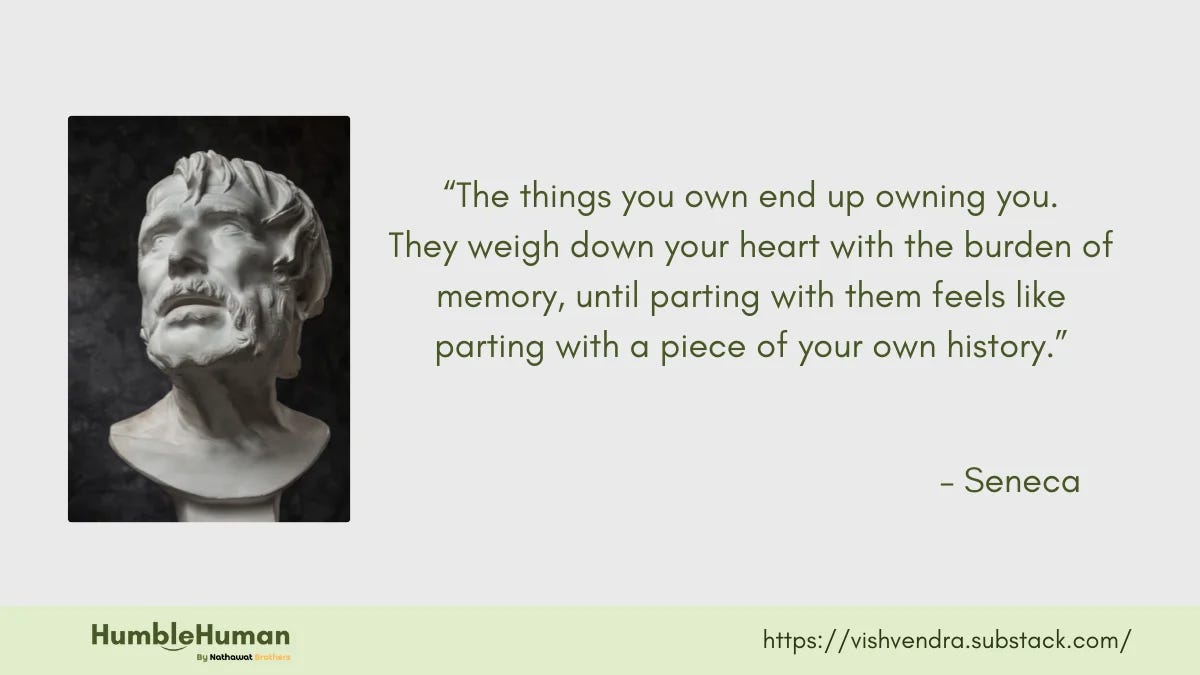Beyond objects: The complexities of memories
A touching reflection on how memories are created through lived experiences, not through possessions.
We all have thrown away our old things or sold them to a junk dealer at some point in our lives. Most people do this. But have you ever thought of selling your most loved thing? This question itself is very complicated because selling emotions can never be easy.
If an object becomes an emotion, you will try to preserve it till the last moment of your life. But what would your thoughts be if the emotion associated with an object made you feel sad?
You have enough time to ponder on it.
If something you love makes you sad, how much can you hold on to it? This shows a significant mental aspect of human thinking.
The story of the thing you love or the simple history behind it will never allow you to lose it.
It can never happen because you know that if you lose it, there will be no greater sorrow in your life than that.
I want to clarify here that I am not talking about gifts given by a boyfriend or girlfriend, nor am I talking about preserving the things that were dear to a loved one who’s not in this world anymore.
The simple emotions that arise in such situations are a momentary feeling of grief and a desire to preserve the gift or the object.
Here, it is important for you to know that in this world, every loving couple gives gifts to their respective partners to make them happy or to express their love, but this does not mean that those gifts are in any way precious for the partner or make them feel sad.
Let's try to understand this through an example.
Suppose your boyfriend or girlfriend has given you a gift (e.g., a rose, a teddy bear, clothes, jewellery, a smartphone, a car, or a house) to make you happy or to give you importance.
How do you preserve that gift in your life now?
Or how can that gift become the reason for your sadness?
Because if you marry the same person, then the value of that gift in life will remain limited to the gift only. Or, if the gift is small, then it will be kept in some corner of the house or in some drawer, meaning that such gifts cannot affect your life in any way.
If the lover is not married, then gifts have no importance in life, and no feelings of any kind can be attached to them. There is no question of sadness. I consider it only and only a funny fraud.
This is a filthy joke played with one's own feelings.
If you do not get married to your boyfriend or girlfriend, let's assume that you will be attached to these things for a year or two and will also be unhappy, but will you not want to move forward in your life?
You will definitely want to, and you will move forward. Perhaps, in order to move forward, you'll trash them or flush them in a toilet.
Then, the gift given by your lover will become a void in your life.
We do the same after the death of our loved one (parent, child, wife, sibling, friend, boyfriend/girlfriend, pet, etc.) and try to preserve their most precious things.
To what extent is this justified, and how long can we keep that object alive? Here, we should know that we do not love that object, but we are remembering our loved one by keeping the memory of our loved one with us.
I did the same when my father passed away; I put all his belongings in a box to keep his memories alive.


But should I really remember him through any object? This question always troubled me.
But one day, fortunately, I realised that I was also a part of him, so I needed to take care of myself before anything else. If I am healthy, I will be able to keep my father's memories and dreams alive and strengthen the home he established.
But this does not mean that I have stopped taking care of his things.
Because those things were close to him, my belief is that it is not wrong to cherish someone's memory. This ignites the feeling of compassion in your mind even more, which prevents you from harming anyone.
When you recall the warmth, kindness, or values they embodied, it serves as a gentle reminder of the qualities that made them special. This reflection creates a ripple effect, softening your perspective toward others and fostering empathy. By holding onto these memories, you're not just honouring them but also nurturing your own capacity for kindness.
It becomes harder to harm others when your heart is anchored in such tenderness, as those memories remind you of the beauty and fragility of human connections.
The conclusion from all the above points is that you cannot create memories by having any kind of feelings for any object or for anyone.
Memories are made only and only by living the moments of life openly.
We cannot preserve memories through an object in any way unless that object brings a change to our nature and our lives.
For example, on 6th February 2006, my father bought a normal car.
At that time, no one in our colony or relatives had a car. When we saw the car for the first time, it seemed very big to us. The happiness of all the family members was at a different level. It was a big gift brought home by my father's hard work.
Slowly, time passed, and our car was getting old, and we kids were gradually growing up.
It was just like in the olden days, when life was simple with horse carts, camel carts, bullock carts, etc., and people considered all these resources the main members of the house.
We, too, had considered our car as a member of the family according to today's times.
It was our responsibility to take care of the car, get it oiled on time, and get it repaired.
Big and small, no matter what kind of job, it was now done by our car. Or, you can say the car was always there.
Papa used to call his car very lucky. On every festival, our sister used to get the car worshipped. Our car has understood our happiness and sorrow very well. This car has seen births, deaths, marriages, etc., with us.
When my dad died, his dead body went to our native village in the same car, which I drove myself and took alone.
I had this car with me when I got married; I had this car with me when my sister got married.
This car was with us when my grandfather passed away, this car was with us when my grandmother passed away, and this car was with us when my maternal grandparents passed away.
Our car has always been with us because we did not have any other means; this may be one reason, but if it has become the reason, then no other means can replace this car now.
When my father bought this car, I was 12 years old, and now this car is 18 years old.
But now I am thinking of bringing another car home in the next two years. Whenever I think of bidding farewell to this one, my heart melts because it is not at all natural to forget the impact that this car has had on our lives in these 18 years.
This car is not just an object or a tool; it is a memory of Papa, of Papa's hard work, of our childhood, of our happiness and tears. And this is what we call a simple feeling towards any object, which later helps in preserving the moments in memories.
Today, we cannot sell our car, and the responsibility to preserve it has become even stronger.
It is very difficult to say what will happen next or how the coming generation will take it, but our endeavour will be to preserve it forever.
What about you? Do you have an object that holds a special place in your heart? Have you ever struggled to let go of something because of the memories tied to it?
I’d love to hear your thoughts and stories. Share them in the comments below—I’m always curious about how others navigate these emotional connections.
Thank you for reading and spending your valuable time here! If this story resonated with you, please share it with someone who might find it meaningful.
And don’t forget to subscribe for more reflections and stories like this. Together, let’s cherish the moments that make life extraordinary.
Till then
Be a humble human
Website | Books | Instagram | LinkedIn | Bluesky













